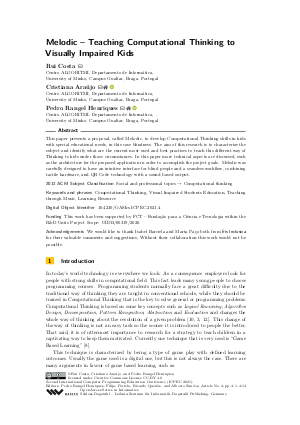@InProceedings{costa_et_al:OASIcs.ICPEC.2021.4,
author = {Costa, Rui and Ara\'{u}jo, Cristiana and Henriques, Pedro Rangel},
title = {{Melodic - Teaching Computational Thinking to Visually Impaired Kids}},
booktitle = {Second International Computer Programming Education Conference (ICPEC 2021)},
pages = {4:1--4:14},
series = {Open Access Series in Informatics (OASIcs)},
ISBN = {978-3-95977-194-8},
ISSN = {2190-6807},
year = {2021},
volume = {91},
editor = {Henriques, Pedro Rangel and Portela, Filipe and Queir\'{o}s, Ricardo and Sim\~{o}es, Alberto},
publisher = {Schloss Dagstuhl -- Leibniz-Zentrum f{\"u}r Informatik},
address = {Dagstuhl, Germany},
URL = {https://drops-dev.dagstuhl.de/entities/document/10.4230/OASIcs.ICPEC.2021.4},
URN = {urn:nbn:de:0030-drops-142205},
doi = {10.4230/OASIcs.ICPEC.2021.4},
annote = {Keywords: Computational Thinking, Visual Impaired Students Education, Teaching through Music, Learning Resource}
}

 Creative Commons Attribution 4.0 International license
Creative Commons Attribution 4.0 International license


